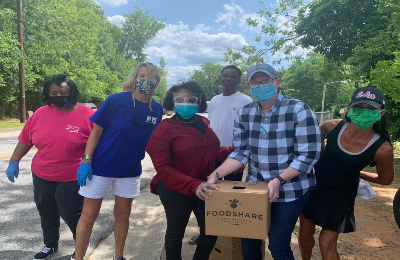
Somewhere, someplace, somehow, an Eat Smart Move More South Carolina (ESMMSC) staff member is guiding a coalition, a partner, a HYPE team, or a partner through a project or process that will lead to a better outcome. It’s called technical assistance, and it’s just one of the driving forces behind the work of the organization. Technical assistance can be many non-financial forms of help like connecting coalitions to funding, sharing information, providing training, consulting on projects, and leadership coaching. That’s what ESMMSC staff do, even during a pandemic.
“Our staff immediately saw the problems people would be facing with food access, especially the children who depended on school food. It’s the one place hungry children can rely on for a sure meal,” said Meg Stanley, executive director at ESMMSC. “We couldn’t imagine having hundreds of thousands of children sitting at home without healthy meals.”
ESMMSC convened as many statewide and local partners (over 100) to address the emergency food insecurity issues caused by COVID-19. Resources were pulled together, emergency preparedness strategies were shared, and a webpage of resources and food distribution sites across the state was published. All of this coordination, brainstorming, and action happened within two weeks with website updates and food insecurity calls continuing in the months to come.
ESMMSC partnered with Healthy Learners and SC PASOS to create Spanish language versions of the food distribution information located on the ESMMSC website.
“When Healthy Learners approached us about translating the food distribution portion of the website for the Latinx community, we said yes without hesitation,” said Stanley. “We completely embrace diversity, equity, and inclusion, and so it made absolute sense to partner on the translation and distribute the information to the Latinx community.”
As the coronavirus lingered over the following months, ESMMSC applied for and was awarded a grant from the OneSC Fund to provide mini-grants to communities in immediate need of assistance in addressing hunger. Forty communities received funding to purchase healthy foods and personal protective equipment.
“We did not turn our backs on those rapid response grant applicants that were not funded,” said Stanley. “We connected them to other funders and other community organizations and encouraged them to pull their resources together. We were not going to leave them wondering what to do next.”
In addition to connecting the applicants to other resources, ESMMSC staff had the opportunity to provide more technical assistance to communities:
- Assisted in securing grant funds from another source for food distributions.
- Connected state legislators to local coalitions interested in hosting food distributions.
- Volunteered at many food distribution events.
- Connected a restaurant in need of donating food to a local Council on Aging.
- Requested Healthy Blue donate bags for food distributions. And they did!
- Shared stories of local coalitions’ food distribution efforts and how they made them safe for everyone.
“While the coronavirus has been stressful and long, it has brought out the good in people. We’ve witnessed an outpouring of love for those in need from our partners, our community members, and our elected officials,” said Stanley. “Our partners and our staff did a fantastic job leading, connecting, and making things happen in a time of crisis. We’re not out of the woods. Food insecurity remains a priority for us and our partners.”
